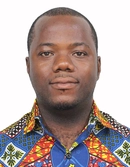Makafui Dzudzor
MSc. Agricultural Bioengineering (Professional focus) 2011-2013
Universite Catholique de Louvain (Belgium)
Msc. Business and Economics (Economics) 2011-2013
Swedish University of Agricultural Sciences
Bsc. Agriculture (Agricultural Economics) 2006-2010
University of Ghana
Food and nutrition security
Food systems
Gender and violence
doctoral work
Prof. Dr. Joachim von Braun
Dr. Nicolas Gerber
2024
and Downloads
- Agriculture, land use, climate change
- Health
- Ghana
NOURICITY project
Food and nutrition security
Food systems
Gender and violence
MSc. Agricultural Bioengineering (Professional focus) 2011-2013
Universite Catholique de Louvain (Belgium)
Msc. Business and Economics (Economics) 2011-2013
Swedish University of Agricultural Sciences
Bsc. Agriculture (Agricultural Economics) 2006-2010
University of Ghana
EC H2020 ERA-Net Co-fund, through LEAP-Agri
PARI
EC H2020 ERA-Net Co-fund, through LEAP-Agri
doctoral work
Prof. Dr. Joachim von Braun
Dr. Nicolas Gerber


